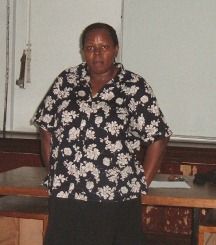 |
| Dr. Joyce Nyoni
|
Cocktails of
anti-HIV medications known as highly active antiretroviral therapy (HAART) ensure
a near normal life expectancy if started early in the course of an HIV
infection. But that stellar accomplishment is predicated on knowing one’s HIV
status. Among marginalized populations such as men who have sex with men (MSM),
particularly in countries where sex between men is a criminal offense, this can
be difficult. Dr. Joyce Nyoni of the University of Dar es Salaam in Tanzania,
East Africa, and her colleague, Dr. Michael Ross of the University of Texas at
Houston, recently examined factors associated with HIV testing in Tanzania.
Writing in
the November 2012 issue of the journal Sexually
Transmitted Infections, Nyoni and Ross report on studies that were solely
funded by amfAR. They analyzed data from 271 MSM in Dar es Salaam, the capital
of Tanzania. They were young—a median age of 24—and 60.5 percent reported
having been tested for HIV. Of the 40 percent who had not been tested, 65
percent stated it was because they “looked healthy,” 7 percent were ashamed, and
28 percent were afraid of the result. Fifteen percent reported discrimination
as a barrier in accessing HIV testing services.
Interestingly,
those who lived with a man or woman—37 percent self-reporting as MSM had
cohabited with a woman in the past year—were more likely to have been tested,
as were those who were older and more educated. There was also a significant
association between the use of a condom with casual partners and HIV testing;
those not tested used condoms more frequently with casual partners. This suggests
HIV testing may be conceptualized more as one strategy for HIV prevention,
rather than as a reason for accessing HIV treatment.
Nyoni
and Ross concluded, “Strategies for increasing HIV testing in MSM will include
information that non-discriminatory treatment is available, the importance of
accessing treatment early, and provision of support for those with a positive
test result.”
Dr. Laurence is amfAR’s senior
scientific consultant.